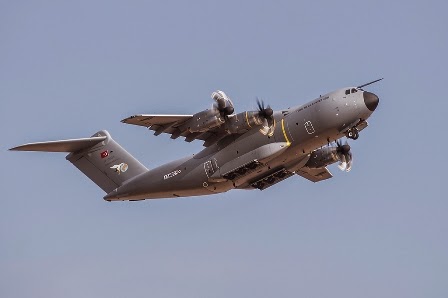The May 9 crash of the A400M airlifter in Spain was a huge setback to Airbus Defense & Space's A400M program, which has been beset...
The May 9 crash of the A400M airlifter in Spain was a huge setback to Airbus Defense & Space's A400M program, which has been beset with problems from the begining.
The production aircraft MSN23 took off for its maiden flight from San Pablo Airport near A400M's final assembly line in Seville after completing ground trials. It suffered technical problems shortly after take off and crashed within 15 minutes.
The crew had contacted air traffic controllers about a technical failure, and while attempting an emergency landing collided with electric cables. Airbus lost four of the six elite Spanish flight test crew onboard.
The military transport was undergoing flight testing ahead of scheduled delivery to Turkey by the end of June. It was the third aircraft for Turkish Air Force of the 10 on order. Assembly of the MSN23 began in November 2014.
The A400M is the most expensive European military program which is estimated at $22 billion and includes UK, France, Germany, Spain, Belgium, Turkey and Luxembourg as partner nations.
The crash could not have come at a worse time for Airbus as the A400M program is already plagued by cost overruns and delay in introduction of promised capability and has sustained cancellation only due to the large investments made.
In January, Airbus reshuffled the program in which head of flight test operations Fernando Alonso replaced Ureña Raso from 1 March as Head of Airbus Defense and Space Military Aircraft program director to bring the program on track.
The crash could be speculated to a production issue, rather than a design flaw as the 17 A400M fleet including 12 delivered to customers and 5 flight test aircraft, has logged close to 10, 000 hours. The type had glitches including engine-control software malfunctions.
Surviving crew members have reported multiple engine failures to investigators. Powering the A400M is the four Europrop TP400-D6 turboprop engines which provide redundancy and is designed to make a successful landing even with single engine operative.
The Spanish military authorities who is heading the investigation has asked Airbus to temporarily suspend flight tests with production aircraft, as a precautionary measure and pending the accident investigation. This will bring fresh delivery delays to the already late program.
Meanwhile Airbus continues its A400M flight test program citing no evidence to suggest that it is not safe to fly.
The first test flight since the accident took place on Tuesday 12 May. Development aircraft MSN4 took off from Toulouse at 14:45 and landed at Seville 1hr 50 min later. This was a regular test flight which was scheduled before the accident. Fernando Alonso, was onboard acting as flight test engineer.
U.K, Germany, Malaysia and Turkey have grounded their A400M fleet until cause is determined. However France has put its fleet of six aircraft to limited operation.
A total of 174 A400Ms have been ordered by the eight nations, to replace their C-130 Hercules and C-160 Transal fleets.
The production aircraft MSN23 took off for its maiden flight from San Pablo Airport near A400M's final assembly line in Seville after completing ground trials. It suffered technical problems shortly after take off and crashed within 15 minutes.
The crew had contacted air traffic controllers about a technical failure, and while attempting an emergency landing collided with electric cables. Airbus lost four of the six elite Spanish flight test crew onboard.
The military transport was undergoing flight testing ahead of scheduled delivery to Turkey by the end of June. It was the third aircraft for Turkish Air Force of the 10 on order. Assembly of the MSN23 began in November 2014.
The A400M is the most expensive European military program which is estimated at $22 billion and includes UK, France, Germany, Spain, Belgium, Turkey and Luxembourg as partner nations.
The crash could not have come at a worse time for Airbus as the A400M program is already plagued by cost overruns and delay in introduction of promised capability and has sustained cancellation only due to the large investments made.
In January, Airbus reshuffled the program in which head of flight test operations Fernando Alonso replaced Ureña Raso from 1 March as Head of Airbus Defense and Space Military Aircraft program director to bring the program on track.
The crash could be speculated to a production issue, rather than a design flaw as the 17 A400M fleet including 12 delivered to customers and 5 flight test aircraft, has logged close to 10, 000 hours. The type had glitches including engine-control software malfunctions.
Surviving crew members have reported multiple engine failures to investigators. Powering the A400M is the four Europrop TP400-D6 turboprop engines which provide redundancy and is designed to make a successful landing even with single engine operative.
The Spanish military authorities who is heading the investigation has asked Airbus to temporarily suspend flight tests with production aircraft, as a precautionary measure and pending the accident investigation. This will bring fresh delivery delays to the already late program.
Meanwhile Airbus continues its A400M flight test program citing no evidence to suggest that it is not safe to fly.
The first test flight since the accident took place on Tuesday 12 May. Development aircraft MSN4 took off from Toulouse at 14:45 and landed at Seville 1hr 50 min later. This was a regular test flight which was scheduled before the accident. Fernando Alonso, was onboard acting as flight test engineer.
U.K, Germany, Malaysia and Turkey have grounded their A400M fleet until cause is determined. However France has put its fleet of six aircraft to limited operation.
A total of 174 A400Ms have been ordered by the eight nations, to replace their C-130 Hercules and C-160 Transal fleets.











